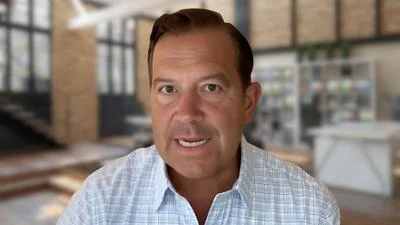Bryce Hill, Director of Fiscal and Economic Analysis at the Illinois Policy Institute, said that Illinois families are too occupied with work and family responsibilities to monitor tax and budget decisions. He made this statement on the Prairie State Wire podcast.
"So many of us don't have the luxury of being able to, I get paid to do this for a living, right," said Hill. "So I get the luxury of being able to spend a lot of time and energy focused on that. Most other Illinoisans don't have that. They're caught up in their day-to-day lives, their own work schedules, their kids, and just trying to make ends meet."
Illinois families are currently navigating changes in tax-and-budget policies following the approval of the FY2025 package. This package raised approximately $1.2 billion in revenue through increased sports wagering taxes and limitations on business deductions, while also introducing a new Child Tax Credit and planning to phase out the 1% grocery tax by 2026. According to the Associated Press, Democrats argue these changes aim to protect working families, whereas Republicans caution about potential hidden costs, keeping fiscal debates prominent.
WalletHub reports that Illinois households will face an effective total state-and-local tax rate of 16.58% in 2025, resulting in an annual bill of $13,099 for a median U.S. household earning $79,004 when considering average home value and vehicle costs. This reflects the combined burden of property, income, and sales/excise taxes that Illinois families must bear.
Illinois consistently ranks among the highest-tax states in the nation. MoneyGeek has given it an "F" grade and ranked it 50th out of 50 states for taxpayer burdens in 2024. The Civic Federation highlights Illinois’ significant property taxes and an average combined state-local sales tax of 8.86%, which is seventh highest nationally.
Hill is responsible for analyzing state budgets, taxes, and the Illinois economy at the Illinois Policy Institute. He joined the Institute in 2018 after serving as an economic research assistant at The Buckeye Institute in Ohio. His research frequently utilizes labor-market and small-business data to evaluate state policies.
The Illinois Policy Institute was founded in 2002 and is based in Chicago. It is a nonprofit 501(c)(3) research and education organization focused on tax, budget, education, jobs, and government reform. According to its official website, while it does not lobby or endorse candidates directly, it is supported by a separate 501(c)(4) advocacy partner dedicated to promoting free-enterprise solutions to state challenges.
___________
FULL, UNEDITED TRANSCRIPT
Bryan Hyde: [00:00:00] Welcome to the Prairie State Wire Podcast. I'm Brian Hyde, and today I'm joined by Bryce Hill, who's the Director of Fiscal and Economic Analysis with the Illinois policy at Institute. Bryce, it's great to make your acquaintance, I'm sure I'm leaving a few things out. For those meeting you for the very first time, take a moment to tell us a little bit about who you are and what you do.
Bryce Hill: Sure. So thanks for having me. I'm like you said, Bryce Hill, the Director of Fiscal and Economic Analysis with the Illinois Policy Institute. The Illinois Policy Institute is a nonprofit, a nonpartisan organization that's the leading voice for taxpayers in the state. So we, our mission is to be a voice for taxpayers, represent their interests both in the state capital and in local governments, and really bring constituents.
The information that they might not otherwise be receiving about what's happening with state and local government, finances, education, taxation, different public policies. A real goal was to inform them [00:01:00] and, and to. Help represent their interests, both with those who are representing them and in various forms of government, and hopefully influence them in a positive direction for taxpayers within the media and other channels.
Bryan Hyde: Bryce, I think it's easy sometimes for everyday people to, to outsource all the budgeting tax issues. Well, that's why we have, you know, elected officials. It's their job to worry about it. Talk to me for a moment about why it is important for every day. Illinois citizens to understand what's going on and to, to be involved in what's going on with those budget and tax issues, even at the local level.
Bryce Hill: Yeah, I think you're exactly right. So many of us don't have the luxury of being able to, I get paid to do this for a living, right? So I get the luxury of being able to spend a lot of time and energy focused on that. Most other Illinoisans don't have that. They're caught up in their day-to-day lives, their own work schedules, their kids, and just trying to make ends meet.
[00:02:00] And so we do all outsource a lot of that. And the problem is that. With, when there's little oversight, there's little accountability. And so, you know, you wanna assume that, you know, there's nothing nefarious going on, or that everybody has robust interests in mind and you elect them. But the unfortunate reality of politics is there's all these different pressures from, um, interest groups, polling politicians in different directions.
Trying to get them to vote certain ways. And all of these decisions have ultimately implications for the taxes that you pay, whether they be property taxes, which in Illinois are the second, or sorry, the the highest in the nation now, or income taxes, or sales taxes, which are all relatively high in Illinois as well.
So it's incredibly important to be vigilant and informed about what's happening with public policy, state and local budgets. You know. Property taxes largely are set at the local level, but they also are affected by choices that state lawmakers make. And then at the [00:03:00] same time, the state budget, we just passed one about a month ago, record sending, spending a variety of different kinds of tax hikes coming through that and.
You know if, if you are this Joe average trying to get through life, yet, you might not notice it, but over time, you know, especially when you get your property tax bill in the mail or when you see your paycheck and you're wondering, man, it doesn't feel like I'm getting as much as I used to. Maybe you're noticing fewer services at the local level, or maybe you're noticing your tax bills going up and you start to question why.
Well. We're here to try to kind of tell you why and also look out for people so that, so that they can have a little bit more say in an easier to consume format than having to track all this down themselves.
Bryan Hyde: You know, and, and among those, those many issues that that can come up as, as a part of those, uh, budget tax, fiscal priorities.
You mentioned, or at least I see in your, your information here, Illinois' pension crisis is one of the biggest challenges that [00:04:00] they're facing. Break that down for me. Talk to me about, about the, the crisis and, and, and where did it originate?
Bryce Hill: Sure, yeah. That's the, that's the elephant in the room. You can't have a conversation about.
Government finances at any level without, without quickly running into issues related to Illinois pension structure and as we like to call it, the crisis that's going on. So just for a little bit of background. Illinois pensions are the retirement benefits paid to public sector workers, and so they're not necessarily the same as your private sector retirement, where you might contribute money to a 401k and your employer might contribute money to a 401k, and it creates basically this investment account that depending on whatever happens in the market, when it comes time to retire.
You have this pool of money that you can then, you know, choose to begin withdrawing from and plan for your retirement. Pensions kind of work the opposite way. There are, what's the call, what are [00:05:00] called defined benefit plans that we have. So it means, regardless of what happens during your career, how much money you put in or your employer puts in, there's a guaranteed benefit upon your retirement that you are set to get.
And it is. Constitutionally guaranteed according to the state's constitution and backed by taxpayers ultimately. So regardless of what's happened over the course of your 30 year career, whatever, as a, as a public employee, you know that you're going to get a certain benefit and that it's going to be there and grow year after year over time in your retirement no matter what's happened.
So that's kinda the general structure. To, to think about them. And the benefits are incredibly generous. So public sector retirees, especially ones that are older in terms of, you know, they, they were hired prior to 2011. They're what's known as tier one pensioners and they get extremely early retirement ages.
Most of them can [00:06:00] retire as early as 58, uh, without penalty. That first year of retirement, if you worked your entire career, you're gonna get somewhere around 75%. Of your final average salary in retirement. And what that ultimately means is that upon your retirement, the average career worker is going to get an annual benefit of somewhere around $93,000.
So it's a pretty good amount for any given year. Yeah, it is. And the disconnect. The disconnect comes is when you look at one, what contribution rates have been so. Between the employer, so whatever government body is employing them plus, uh, contributions that they make out of their own salary, the average pensioner is going to contribute somewhere around $129,000 to their retirement to begin drawing, you know, uh, a 90 something thousand dollars pension.
So very quickly, within just a matter of less than two years. All that money that was contributed on behalf of an employee is, is [00:07:00] completely consumed by the benefit that's been given. And then that benefit then grows at a compounded 3% every year, guaranteed. There's a guaranteed raise every year that happens.
And so very quickly, in just a few short years, you not only exceed the salary you were making during your career and you're being paid $30,000 more than the average Illinois is, who makes about $69,000 a year, but. You, so you exceed the contributions that you made and you start drawing more and more off the system.
And the funding, the, the amount of resources available in the state's coffers cannot support this. So as a result of these luxurious benefits, the state has $144 billion in unfunded pension liabilities. That means for current retirees and participants in the five state run systems. We only have 46 cents on hand for every dollar that we're going to be paying out in the future.
So in other [00:08:00] words, we're, we're precarious in a very precarious financial situation when it comes to paying out these benefits in the pool of resources that are supposed to be used to fund these. And so when we have this high level of pension debt, it requires us to make large contributions to try to.
Increase the amount of resources that we have to be able to pay them in the future. So for the state budget, for example, almost $12 billion every single year goes to Illinois' pension systems. Out of a $55 billion budget, that's almost, that's roughly 20%. So you know, one in every five of your tax dollars is going to pensions.
It's not going to services, it's not going to roads or infrastructure. It's going to pay towards this debt, and almost all of that's going to debt, so it's not going to pay. You know what? The current people who are working right now are accumulating in benefits right now that amount's about $2.5 billion.[00:09:00]
The remaining nine and a half million dollars or so is going to pay for this debt that's accumulated because of the rapid growth and benefits. So when we're eating up one in every five tax dollars that comes into the states. Callers to go towards this debt burden that leaves a lot less money for the services that Illinois care about.
Like schools, higher education, roads, public safety. You name it, they're all gonna face budget constraints because of this.
Bryan Hyde: Bryce, I'm curious, among those very high, highly paid pensioners in, in Illinois, what were the, what parts of government did they work for? I'm just, I'm just curious, what was the most lucrative part of government to be a part of where they could, you know, enjoy the best retirement?
Bryce Hill: Sure. So the it, it depends on how you wanna measure it. If you wanna look at return on investment compared to your contributions. The state employee's retirement system is, is actually the best. [00:10:00] However, that's because their contribution rates are are slightly lower than than average, and so they don't actually get the highest dollar amount in retirement.
The highest dollar amounts actually go most often to state university employees, judges, and superintendents who participate in the teacher's retirement system. So those are where the top earners are. We actually have. 32,000 Illinoisans or public pensioners who are earning more than $100,000 in their retirement this year, and there's 327 of those are earning more than $250,000 this year in their retirement.
And that's because they had very high paying jobs, whether they be judges or superintendents of school districts or university professors. Oftentimes those are sometimes also hospital staff, so like surgeons and things like that at university. Hospitals will also be able to participate in these systems, so you not only [00:11:00] have a very high paying career and have the means to be able to save for your retirement in addition to the guaranteed pension that you're getting, but.
You also get a very high guaranteed pension in your, uh, retirement as well.
Bryan Hyde: One of the reasons I asked about this is because as you're describing Illinois' pension crisis, I'm thinking about California. I think I've heard, I've heard many of these concerns and more about how California is, you know, in, in very same situation.
And it seems like superintendents in, in education, especially higher education, they seem to do very well. Police and fire. Believe it or not, make incredibly good money and, and in retirement command a lot too. Let, let's bring it back to Illinois though. If this isn't addressed, if there's not some kind of reform, what then what, what are we flirting with down the road?
Bryce Hill: Yeah. There's two very important points to make hear about if, if nothing changes. So one, I think, [00:12:00] and arguably most importantly, is. Our public sector employees, our public servants, you know, thousands of teachers have been told that this is a guarantee that their pension is a promise and that they don't need to worry about their retirement security.
You know, their, their union and their representatives at the state level have it covered and that there's going to be a retirement for them when they come time to retire. And right now, if we keep heading down the path that we are heading. That very well might not be the case. So I mentioned there's a 46% funding ratio, so we have 46 cents on hand for every dollar.
Actuaries say that when you dip below 40%, so when you dip below 40 cents on the dollar, it is what they call oftentimes the point of no return, meaning that regardless of the investment returns that you're able to make and the contributions that you're likely to make, it's very difficult. For that system to actually [00:13:00] recover and become healthily funded again.
Meaning that there's going to be money to pay out two retirees in the future. So if we don't change something, that promise is going to be broken. And the, there's almost 250,000 retirees currently in the system. Those people are relying on this. And so that's an unacceptable outcome to drag our feet and not do anything about this crisis because.
Because thousands and thousands of public sector workers are relying on this, many of them, you know, likely don't have massive resources beyond save for retirement beyond their pension because they've been told they don't need to. They, they make their pension contributions out of their salary, assuming that this, the government's also going to make that payment and that they're being responsible with, with funding and how they distribute the money and that it's gonna be there.
And that's. We are very easily not be the case. Our, our current [00:14:00] contributions are actually below what's known as the tread water level. So as we continue to make payments, our pension debt continues to grow even though we're making billions and billions of dollars in higher payments over time, uh, as taxpayers, because.
The benefits being paid out are so great, and the investment returns aren't as as ambitious or aren't as coming in as expected, you know, historically. And so we're paying more, but that debt keeps growing as at an all time high right now when the funding ratio remains basically unchanged year after year because we're below this tread water level.
So that's the danger for retirees. For taxpayers, it's. This $144 billion bill, essentially that it remains un undetermined how it's going to be resolved. So if we don't have any changes, there's going to be essentially massive tax hikes on generations of Illinois. Illinois and Sue, you know, some of them might not even be born right now, are going to be paying [00:15:00] for this legacy debt for decades to come because the state's current funding plan.
They have plans to try to pay off this debt by 2045. It hasn't exactly worked out the way originally it was originally intended, but there is a schedule for increasing these payments for the next 20 plus years. And as that debt continues to grow, the amounts that are required for that continue to go up and will likely have to go up even more to to, to satisfy that.
And so. Future generations of Illinoisans are gonna be paying higher taxes at the state level. Property taxes are gonna continue to go up, as I mentioned, and ultimately, it's leading to why many Illinoisans are leading the state.
Bryan Hyde: So, Bryce, talk to me about what the Illinois Policy Institute is, is doing in terms of representing taxpayers and in, in terms of what kind of, what kind of solution is the Illinois Policy Institute to urging [00:16:00] Illinois officials to consider?
Bryce Hill: Yeah. So the, the biggest thing that we're doing is we are constantly engaging with, with state lawmakers right now, primarily, but also some at the local level to build support for a constitutional amendment. So I mentioned earlier that the Illinois Constitution guarantees these pension benefits and in a 2015 ruling, actually, let me back up a little bit, give a little bit more context here.
There was a, a reform that was passed in 2013. Bipartisan at the state level. That created changes to the accumulation of benefits for, for pensions. So there was, there were changes made to slow that rapid growth and pension benefits going forward. It wouldn't have reduced anybody's current paychecks, but it would've, it would've made that acceleration much more manageable.
The Illinois Supreme Court ruled that that was unconstitutional in 2015 because of a clause in the state constitution that [00:17:00] says these benefits cannot be diminished or impaired. So the first thing that has to happen before we talk about what the, the. Details of the changes need to be is that the state needs to pass a constitutional amendment, which has to be done by state lawmakers that amends that clause to say, you know, they, they can be altered.
So we need the state's constitution to be changed to allow for changes in the structure of pension benefits. And that's first. The second thing is the details of how that pension benefit is going to change. So in the past we've supported reform similar to that of the 2013 bipartisan reform, which would have done a series of things.
It would've put a cap on the amount of pension benefits that are able to be paid out. So you would've had a cap on on those six figure pensioners that we talked about. It would've capped and then tied cost of living, adjustments to [00:18:00] metrics actually tied to inflation. Right now, tier one benefits. Grow at, excuse me, grow at a guaranteed 3% compounded every single year until just a few years ago.
We had gone essentially decades without seeing inflation rates that even sniffed 3%. So flowing down and tying cost of living adjustments to actual measures of inflation was another part of that. Capping the pensionable salary and increasing retirement ages to be more in line with. The private sector and social security benefits.
So instead of being able to retire, you know, at age 58 with full benefits, making that closer to 60, 62, 65, like social security benefits are tied to all of those things, that combination of things, previous analysis showed that one, we could actually begin reducing the amount of money that we spend on pensions every single year.
So that $12 billion bill would actually go down over time. Instead [00:19:00] of going up over time like it's scheduled to right now, and two, our funding ratio would've actually been projected to reach 100% by 2045. The ca, the state's current target is 90% and we never actually hit the funding targets as they go year to year.
We haven't actually hit those funding targets either, so it would've actually created the sustainable path for meeting funding targets, getting us to a healthy spot. Having taxpayer interest in mind, bringing down that pension payment, and very importantly not reducing any current pension payment that anybody is receiving at all.
So people's current benefits that they're getting wouldn't have been changed.
Bryan Hyde: Bryce, we are unfortunately up against the clock, but I'd love if you would give a link where, where people can go to find out more about the work you're doing with the Illinois Policy Institute.
Bryce Hill: Sure. Illinois policy.org is the website.
You can find all this many, many other reports and and interesting [00:20:00] investigations. And on social media at at Illinois Policy, any social media platform you want.
Bryan Hyde: Again, we're talking with Bryce Hill, the Director of Fiscal and Economic Analysis with the Illinois Policy Institute. Bryce, great to visit with you and thanks for joining us today.
Bryce Hill: Yeah, thank you so much for having me.
Bryan Hyde: This is the Prairie State Wire Podcast.






 Alerts Sign-up
Alerts Sign-up